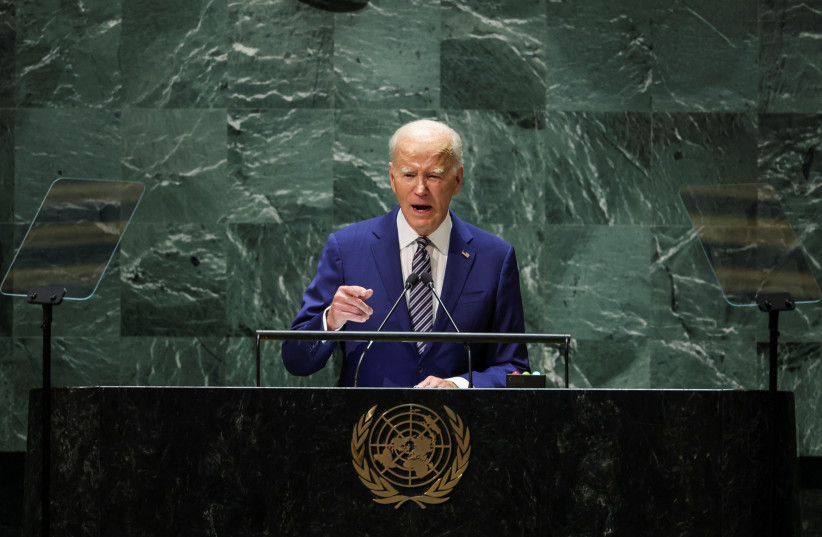Since Saturday’s surprise Hamas attack, US President Joe Biden has voiced unequivocal support for Israel and its right to protect its citizens.
The Pentagon even diverted a carrier strike group, including the state-of-the-art USS Gerald R. Ford aircraft carrier, to the Eastern Mediterranean as a show of support for Israel. The dispatch of the carrier strike group to the region sends a strong message to Iran and Hezbollah not to take advantage of the current chaos to open up a second and even third front against Israel, because America will support the Jewish state.
Those moves have been widely applauded in Israel, and no one in Jerusalem is talking about the $6 billion that the US freed up for Iran last month as part of a prisoner swap with the Islamic Republic. Few in Israel, at least in officialdom, are linking the dots between that payment – or softening sanctions on Iran that freed up money for other uses – and Iranian support for Hamas and Palestinian Islamic Jihad.
But they don’t have to. Those dots are being duly connected in America.

Availability of the funds helped attacks
Already on Saturday, Republican presidential candidates, including former president Donald Trump and Sen. Tim Scott (R-South Carolina), as well as other Republicans in the House and Senate, lashed out at Biden for the release of the funds and connected it to the Hamas attack. Not that those funds were used to sponsor the attack, but that the availability of that money allowed Iran to move money to its terrorist proxies.
Under the deal, $6b. in Iranian oil fund revenue frozen in South Korea was released as part of the prisoner-exchange deal.
“This is exactly why so many Americans and Israelis were disgusted to see [Biden] give the Iranian regime $6 billion last month,” Sen. Rick Scott (R-Florida) posted on X. “Every dollar given to Iran funds terrorism in the Ayatollah’s quest to destroy Israel. Iran is behind today’s invasion, and everyone must say that.”
The US administration adamantly denied this, and US Department of the Treasury Under Secretary for Terrorism and Financial Intelligence Brian Nelson said: “All of the money held in restricted accounts in Doha as part of the arrangement to secure the release of five Americans in September remains in Doha. Not a penny has been spent.
These restricted funds cannot go to Iran – it can only be used for future humanitarian-related purposes. Any suggestion to the contrary is false and misleading.”
Even if Iran did not directly pay Hamas out of this money, some critics, such as former South Carolina governor and presidential candidate Nikki Haley, stressed that money is fungible.
“Let’s be honest with the American people and understand that Hamas knows, and Iran knows, they’re moving money around as we speak because they know $6b. is going to be released. That’s the reality,” she said.
The notion that America, by freeing up funds for Iran, was indirectly responsible for building up Hamas gained traction Sunday, following a Wall Street Journal article asserting that Iran was closely involved in planning Saturday’s sophisticated attack, even signing off on the attack last week.
US journalist Eli Lake, writing for the Free Press website, asserted that US culpability in helping build up Hamas was not limited to funds going to Iran.
In addition, he wrote, the Biden administration’s policy of restoring $360 million in US funding for Palestinian development benefited Hamas, and internal State Department documents showed that there was concern that Hamas could “potentially derive indirect, unintentional benefit from US assistance to Gaza.”
“This raises an obvious question after the slaughter on Saturday: Was the bulldozer that Hamas used to demolish a border fence between Israel and Gaza, which opened a path for terrorists to flood into Jewish towns and kibbutzim, paid for in part with US development aid?” he asked.
Furthermore, he wrote, there is also the strong US support for Qatar to consider. Lake pointed out that last year, Biden designated Qatar as a “major non-NATO ally,” a designation that “was a major diplomatic reward for a country that to this day allows much of the senior leadership of Hamas, including its political leader, Ismail Haniyeh, to live there. (That US-Qatari deal did not include conditions to expel these figures.)”
While it is interesting that these issues are being raised more in the US than in Israel, it is also understandable: Israel has had its own share of guilt over the years for strengthening Hamas.
For instance, since 2018, Israel has relied on Qatar to bring suitcases with millions of dollars to maintain the quiet. Critics such as Avigdor Liberman have called these payments “protection” money to Hamas.
In addition, Israel has given work permits to thousands of Gazans – some 20,000 under the current government – even though it was clear that this money strengthened the economy in Gaza and that part of it was diverted to Hamas.
Were Israeli officials to criticize the US for making funds to Iran available that could then go to support Hamas, US officials could quickly respond by saying that Israel should look in the mirror. All of which helps explain why the $6b.
US payment to Iran is much more of a story in the US than in Israel.
